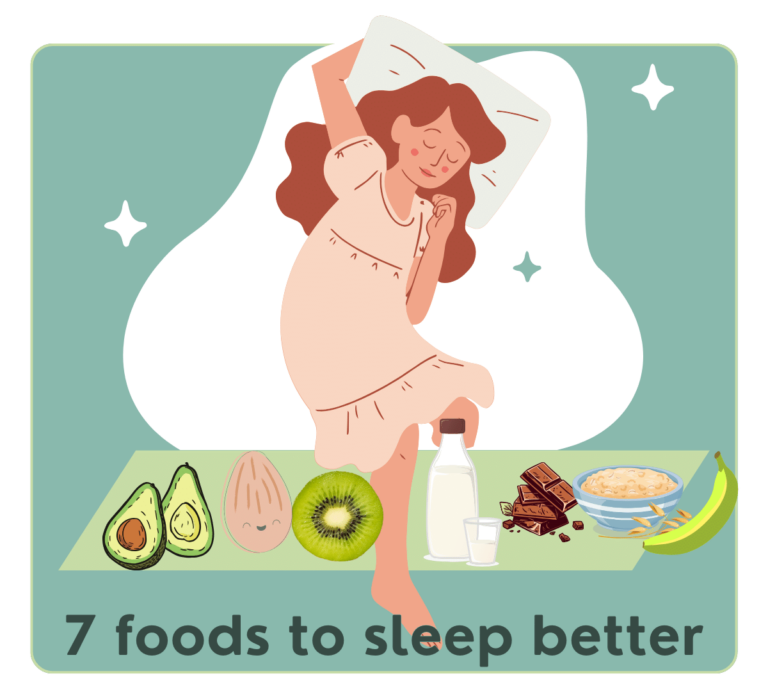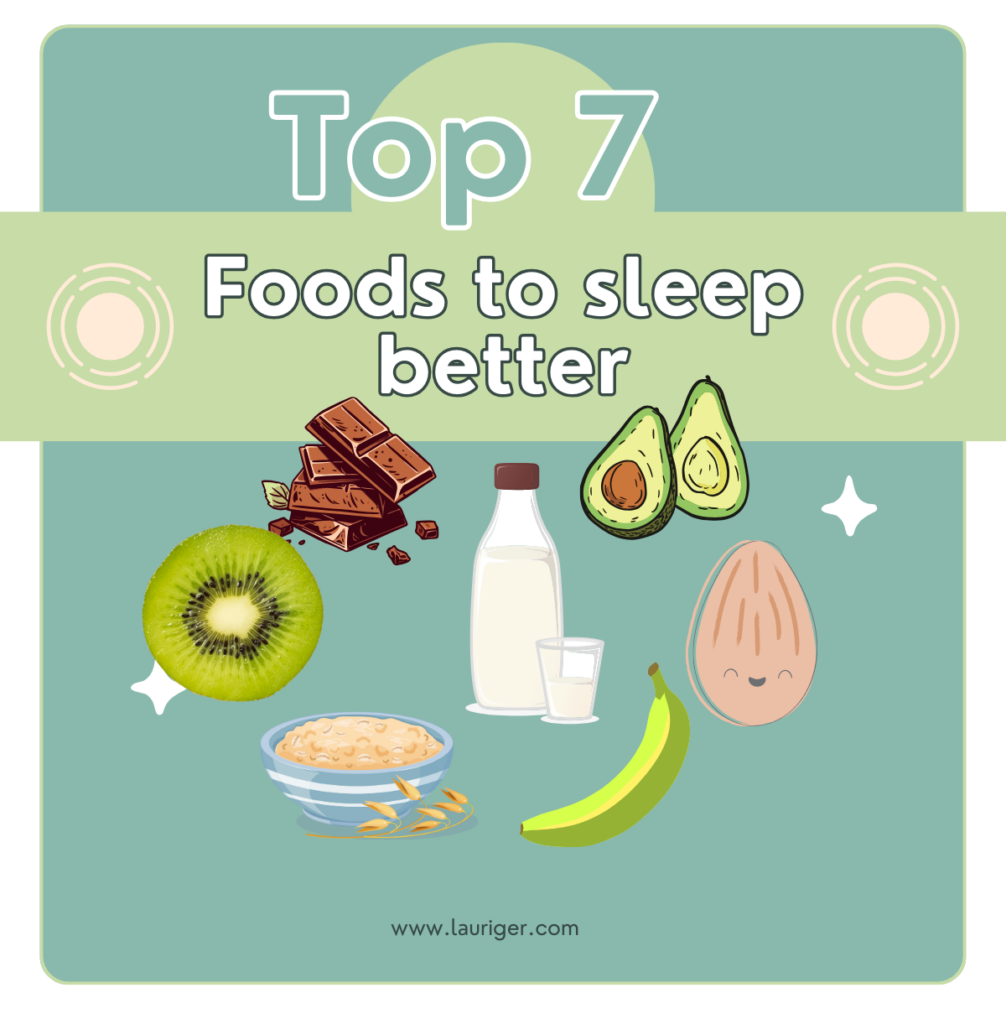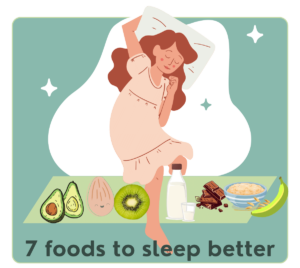Top 7 Foods to Eat Before Bed to Support Your Sleep Naturally [updated with tips on how to eat them]

In this blog post, you'll learn:
Newsletter Subscription
Stay up-to-date on all the news from Lauriger
Pay attention to your diet to improve your sleep quality. Learn what foods to eat and how for maximum benefits.
You may have heard that your evening diet can affect your nightly rest. Eating heavy meals requires substantial digestion, hampering your body’s ability to rest. This can lead to waking up during the night and feeling tired, hungry, or thirsty in the morning.
Key Nutrients Supporting Better Sleep
Instead, opt for foods that help stabilize your blood sugar levels, avoiding nighttime glucose spikes and crashes that can disrupt your sleep.
We selected foods rich in probiotics and prebiotics for gut health, magnesium to relax muscles and nerves, dietary fiber to keep you fuller longer, and tryptophan, an amino acid that serves as a precursor to serotonin and melatonin—hormones that regulate mood and promote restful sleep.
But don’t just eat them randomly and without preparation. Use these simple hacks to consume foods in the correct order and prepare them in the right way to minimize glucose spikes and support optimal gut health.
Top foods and what order to eat them:
Begin every meal with a salad
Before we proceed, we must introduce one essential component: salad. Ideally dark, leafy greens like spinach: approximately 79 mg of magnesium, swiss chard: 81 mg of magnesium, kale 47 mg of magnesium, mustard greens 32 mg of magnesium, radicchio, rocket leaves.
Greens are rich in essential vitamins (like A, C, and K), minerals (such as magnesium and iron), and fiber. Eating them first ensures you get these nutrients, which are less likely to be consumed in the later, more calorie-dense parts of the meal. The fiber and water content in greens helps you feel full sooner, which can prevent overeating later in the meal. Greens contain prebiotics that nourish the good bacteria in your gut. Starting with greens can stimulate the production of digestive enzymes, preparing your stomach for the main course and improving overall digestion.

Top 7 foods to support good sleep
You don’t have to eat them all, but if you do, eat them in this order.
- Avocado ~29 mg of magnesium per 100g. As well as being high in magnesium, avocados are a good source of tryptophan, an amino acid that is a precursor to serotonin and melatonin, hormones that regulate mood and sleep. Eating avocados in the evening helps you feel full due to their high fiber and healthy fat content, which may prevent late-night snacking and improve sleep quality.
- Almonds ~270 mg of magnesium per 100 grams. Almonds are an excellent source of magnesium. However, be mindful of the skins containing lectins that may irritate sensitive stomach linings and contribute to a leaky gut. To easily peel your almonds, rinse them and boil for 1-2 minutes. Be cautious, as they will be hot, but this is when the skins slip off effortlessly. This can be a fun activity to do with kids, and you’ll enjoy how soft and sweet the peeled almonds taste.
- Green Bananas ~27 mg of magnesium per 100g. Please eat bananas when they are green. Why? Unripe bananas have a higher resistant starch content, acting as an excellent prebiotic that supports gut health. Conversely, ripe bananas have a high sugar content due to the conversion of starches into sugars as they ripen. Avoid eating them when they are yellow, soft, and large. If they ripen at home, freeze them and blend them into banana ice cream. Frozen bananas are often consumed in smaller quantities, and homemade banana ice cream is much healthier than most store-bought varieties.
- Dark chocolate (with a minimum of 75% – 85% cocoa) contains approximately 228 mg of magnesium per 100 grams. Remember, the darker the chocolate, the better it is for you. Start with 75% cocoa and gradually work your way up to 95% or even 100%. Your gut will soon appreciate the sophisticated taste of true chocolate. Here’s a tip: have you seen whole cocoa beans in your store? Grab some and add a few to your nut mix, eat them with carrots for a well-balanced snack, or enjoy them on their own
- Kiwi with skin Magnesium: ~17 mg. Eat the kiwi whole, including the skin. Surprised? The skin of a kiwi contains a significant amount of dietary fiber, which acts as a prebiotic, promoting the growth of beneficial gut bacteria that support gut health and digestion. Kiwi skin also has a higher concentration of antioxidants, such as vitamin C and polyphenols, than the flesh alone. These antioxidants help protect your cells from oxidative stress and reduce inflammation. Additionally, the skin is rich in vitamin E and folate, contributing to improved immune function and overall health.When eating kiwi whole, make sure to wash it thoroughly under running water. Cut off the hard, woody edges, and choose organic kiwis when possible to reduce exposure to pesticides and other chemicals.
- Oats soaked and dressed 100g of oats contain approximately 177 mg (44% DV) of magnesium. While I’m not a huge fan of oats, if you enjoy them, try eating them in the evening prepared this way:
- Choose the Right Oats: Opt for whole, unprocessed oats (often called oat groats) from organic sources that are not sprayed with glyphosates. This herbicide can disrupt your microbiome and lead to genetic damage.
- Activate Your Oats: To enhance the nutritional value and ease digestion of your oats, activate them before eating. Here’s a quick method:
- Rinse and drain the oats in cold water a couple of times to remove any dust or debris.
- Place the rinsed oats in a large bowl or jar.
- Cover them with plenty of cold water, using about three times as much water as oats since they will expand.
- Let them soak for 12-24 hours to start the germination process by softening the outer shell.
- Dress Your Oats: To minimize the impact of carbohydrates on your glucose levels, “dress” your oats with MCT oil and olive oil, and sprinkle a few berries, preferably small blackberries or pomegranate seeds. For extra sweetness, use stevia, which is my absolute favorite.
- Now, let’s talk about a hero food: kefir. How can kefir help you sleep? This rich probiotic drink contains five times more microbes than yogurt. It is packed with gut-friendly bacteria, beneficial yeast, and friendly candida. The combination of these microbiomes helps your body produce serotonin, a powerful neurotransmitter that acts as a precursor to melatonin, the hormone that regulates sleep.
In addition, the yeast in kefir helps break down milk proteins like casein, making cow’s milk easier to digest. If you can find goat milk kefir, opt for that as it may be even gentler on your digestive system.
Kefir is also a good source of B1 (thiamine), which is essential for reducing stress and anxiety and supports the parasympathetic nervous system.
Moreover, kefir aids in the absorption of essential minerals like calcium and magnesium from other foods. For optimal benefits, drink 1 cup of kefir at the end of your last meal, preferably 1 to 2 hours before bed.
In summary
Adding these food hacks into your daily routine can significantly improve both your gut health and sleep quality. Start your meals with greens, opt for green bananas, activate your oats, peel your almonds, and enjoy a cup of kefir before bed. These simple steps can help you achieve better digestion, stress reduction, and restful sleep. Which one is your favourite?
Sign up to our newsletter
By subscribing, I accept the privacy policy and I give my consent to receive Lauriger emails about news and offers.
© 2023 Lauriger. All rights reserved.
